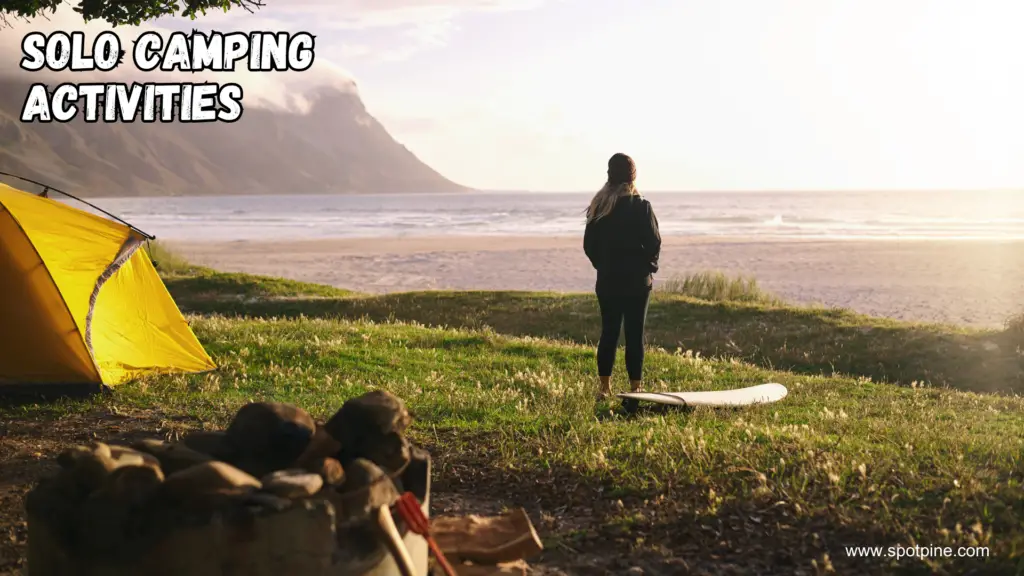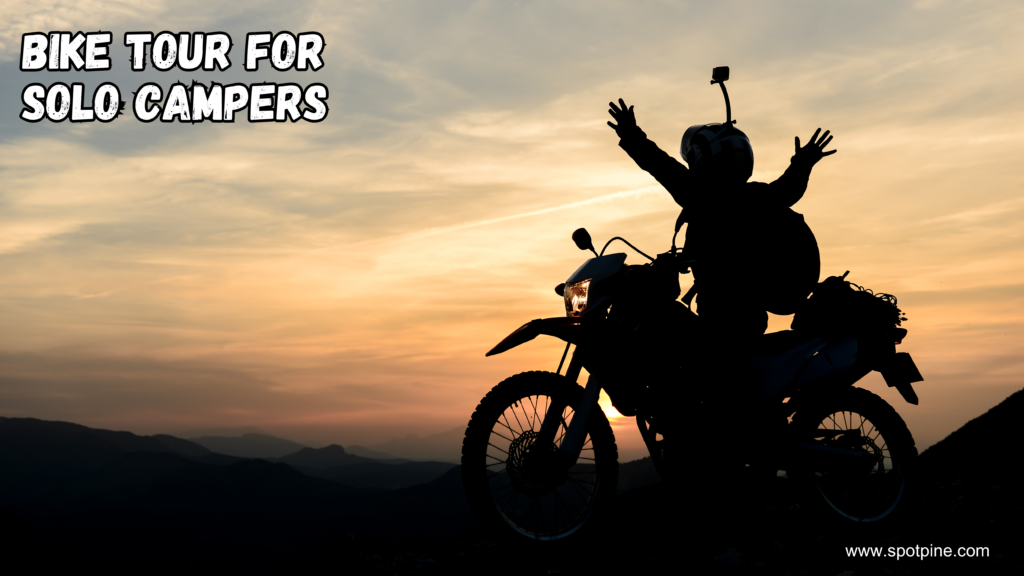Solo camping activities include hiking, stargazing, wildlife watching, and campfire cooking. Enjoy nature and the wilderness on your own with these activities.
Camping alone is a thrilling and awe-inspiring experience that allows you to spend quality time with nature and yourself. It’s an ideal way to unwind and refresh from the chaos of everyday life. There’s something alluring about wandering through the wilderness on your own, being self-reliant, and tackling new challenges.
Solo camping grants you the peaceful serenity you require to reflect, meditate, and connect with nature. It also enables you to participate in a range of fun and exciting activities, depending on your preferences. We will cover some of the most popular and entertaining activities to undertake while camping alone.
Benefits Of Solo Camping
Going on solo camping trips can have several benefits, including improving self-reliance, confidence, and self-awareness. When camping alone, you have to rely solely on yourself to set up camp, start a fire, and prepare food, which helps build self-reliance and problem-solving skills. This, in turn, can boost your confidence and sense of independence. Additionally, being alone in nature can help you become more self-aware, allowing you to reflect on your thoughts and emotions without external distractions. Whether it’s taking a solo hike or spending a night under the stars, solo camping can be a fantastic way to disconnect from the digital world and connect with yourself and the world around you.
Essential Gear For Solo Camping
When it comes to solo camping, having the right gear is crucial for a safe and enjoyable experience. Some essential items to consider include:
| Tent and Sleeping Bag | A waterproof tent and a warm sleeping bag are essential for a comfortable camping experience. |
| Cooking and Eating Utensils | Items such as a camping stove, utensils, and food containers are necessary for preparing and enjoying meals while camping alone. |
| Navigation and Lighting | A reliable map, compass, and headlamp are crucial for navigating the wilderness and staying safe after dark. |
| Personal Hygiene Kit | A basic hygiene kit, including soap, hand sanitizer, and toilet paper, is essential for maintaining cleanliness and preventing illness while camping. |
By packing these essential items, solo campers can feel prepared and confident in their outdoor adventure.
Preparation For Solo Camping
Before embarking on your solo camping trip, it’s essential to plan your activities beforehand. You should consider activities that are both challenging and relaxing, such as hiking, reading, or star-gazing. Adequate preparation can enhance your experience, and you will be able to enjoy your time amidst nature.
Bold textCheck the weather forecast/bold text to ensure that you are prepared for any weather conditions during your camping trip. It is essential to choose the right campsite/bold text that is safe and allows for easy navigation and exploration. Making a checklist/bold text of necessary items such as a tent, sleeping bag, food, water, and a first aid kit is crucial to ensure that you have everything you need for your trip. Additionally/bold text, it is essential to notify someone of your plan/bold text by sharing your itinerary and expected return date. This ensures that someone knows your whereabouts and can take necessary action in case of an emergency.
Credit: tetonsports.com
Fun Solo Camping Activities
Solo camping can be a great way to escape the hustle and bustle of everyday life and enjoy some peaceful time in nature. Here are some fun activities you can do to make the most of your solo camping trip:
| Hiking and Exploring Nature | Fishing and Hunting | Nature Photography | Meditation and Yoga |
| Explore nearby hiking trails, observe flora and fauna, climb hills and capture scenic views. | Set up a fishing rod and spend a relaxing afternoon by the river. Get a hunting license beforehand. | Capture natural beauty, try macro photography, capture night sky stars, and make timelapses. | Practice mindfulness, meditate by the river, do yoga asanas, and enjoy the sound of nature. |
| Bring binoculars to watch birds, identify flora and fauna or listen to natural sounds. | Try different bait techniques, connect with nature, and learn about local fish species. | Be creative with composition, capture insects, and make a portfolio with your best pics. | Try deep breathing, listen to music or calming sounds, connect with yourself and nature. |
With these activities, your solo camping trip will be a memorable one. Make sure you plan accordingly, pack the necessary gear and always prioritize safety. Happy camping!
Safety Tips For Solo Camping
Going on a solo camping trip is an adventure like no other. But it’s important to stay safe while you venture out alone into the wilderness. Here are some safety tips that you should remember:
- Be Aware of Potential Dangers: Before you leave for your trip, research the area you’ll be camping in. Become familiar with the weather, wildlife, and any other potential dangers.
- Bring a First Aid Kit: Accidents can happen, so it’s always wise to bring a first aid kit with you. Make sure it contains bandages, antiseptic wipes, and any medications you might need.
- Stay Alert and Mindful: When you’re camping alone, it’s easy to let your guard down. But you should always be aware of your surroundings, listen for any strange sounds, and be cautious with your fire and cooking equipment.
- Trust Your Intuition: If something doesn’t feel right, it probably isn’t. Trust your intuition and have a plan in place for emergencies.
Remember that solo camping can be an amazing experience, but it’s always better to be safe than sorry. Keep these tips in mind, and you’ll be able to relax and enjoy your adventure with peace of mind.
Credit: www.worldpackers.com
Challenges Of Solo Camping
Solo camping activities can be a thrilling experience, but they also come with significant challenges. From establishing camp to cooking and managing emergencies, solo campers need to be self-reliant and prepared for any situation that could arise. However, with proper planning and preparation, the rewards of solo camping can be unparalleled.
Camping alone offers a sense of freedom, yet it comes with some challenges. Loneliness and isolation are common on solo camping trips, and it’s important to prepare yourself before your trip. Fear of the unknown can make your camping trip stressful and uneasy. To combat this fear, research the area and the camping grounds beforehand. Unforeseen circumstances such as bad weather or getting lost can be overwhelming. Plan ahead, pack essential supplies, and bring a map and compass to ensure you’re prepared. Physical and mental exhaustion can also be a concern, especially when hiking or participating in outdoor activities. Make sure you’re well-rested and bring plenty of water and snacks to stay energized throughout your trip.
Personal Growth Through Solo Camping
Solo camping can be a life-changing experience. It offers an opportunity to challenge oneself, and in doing so, can lead to tremendous personal growth. When we are alone in the wilderness, we are forced to confront our fears and doubts. This can be a scary experience, but it can also be incredibly empowering. By pushing our limits and stepping outside of our comfort zones, we can discover inner strengths we never knew we had.
Solo camping also teaches us the value of solitude. In our fast-paced and hyper-connected world, it’s easy to lose sight of the importance of spending time alone. But in the wilderness, we are forced to be with ourselves, and this can lead to profound self-discovery and reflection.
| Benefits of Solo Camping: |
| Overcoming fear and doubt |
| Pushing your limits and discovering inner strengths |
| Embracing solitude and promoting self-discovery |
Solo camping is not for everyone, but for those willing to try it, it can be an incredibly rewarding experience. If you’re looking to challenge yourself and grow as a person, consider taking a solo camping trip. You may be surprised by how much you learn about yourself, and the world around you.
FAQs Of Solo Camping Activities
How Do You Pass Time Camping Alone?
To pass time camping alone, you can read a book, explore the area, take photographs, write in a journal, or stargaze. Set up a schedule for activities, stay organized, and practice safety. Enjoy the solitude and learn to appreciate the beauty of nature.
What To Do At Night When Camping Alone?
When camping alone at night, there are several activities you can do to pass the time. Reading a book or watching the stars are great options. You can also cook some food, meditate, or go for a walk around the campsite.
Always make sure to stay safe and aware of your surroundings.
Is Solo Camping Fun?
Solo camping can be fun and liberating for many people. It provides a unique opportunity to connect with nature, self-reflect, and recharge. However, it may not be for everyone, as some may feel uncomfortable or anxious being alone in the wilderness.
Ultimately, it depends on personal preferences.
How To Camp As A Single Woman?
As a single woman, camping can be a fun and rewarding experience. Always choose a safe and well-lit campsite with good facilities. Plan and prepare your meals in advance. Carry a self-defense tool and a flashlight. Always inform your family or friend about your location and update them regularly.
Conclusion
Solo camping provides an opportunity for personal growth and adventure. Whether it’s hiking, reading, or exploring, there are countless ways to enjoy the great outdoors alone. The key is to plan ahead, be prepared, and embrace solitude. With a little courage and a sense of curiosity, solo camping can be a truly transformational experience.
So pack your bags, leave your worries behind, and discover the joys of solo camping for yourself.



